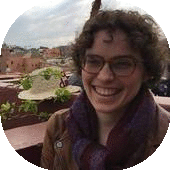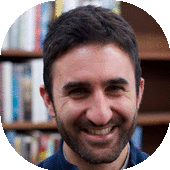Middle East Political Economy Summer Institute Network
SUMMER INSTITUTE PARTICIPANTS
2021 Workshop: Students
Nehal Amer

Nehal Amer is an Assistant Professor of Geography at the University of Louisiana at Lafayette. In 2016-2017, she completed her dissertation research on the politics of extra virgin olive oil production in Jordan. This work traces the ways in which capacity building in the Jordanian olive sector occurs together with international, national, and local development programs and market standards, changing perceptions of quality, value, and best production practices. She specifically focused on capacity building by examining the changing ideas of olive oil quality, the political-economic impacts of organic production, and the various strategies of women’s rural food businesses. This work was supported by the Fulbright US Student Program, the Society of Women Geographers, the CAORC-ACOR Dissertation Fellowship, the Barnhart-Withington Endowment, and the University of Kentucky.
Brittany Cook plans to expand this research further to focus on the impacts of these projects on rural communities and to conduct more research on the historical relationship between development, environment, and governance in the olive industry across Jordan and Palestine.
Brittany Cook plans to expand this research further to focus on the impacts of these projects on rural communities and to conduct more research on the historical relationship between development, environment, and governance in the olive industry across Jordan and Palestine.
Camille Cole

Camille Cole is a PhD candidate in History at Yale University. She holds an MPhil in Historical Studies from the University of Cambridge, and a BA in Politics and Middle East Studies from Pomona College. Her dissertation explores the intersections of land, law, and capital in late Ottoman Basra, focusing on how elite actors used a changing legal and inter-imperial context to accumulate capital and consolidate power, and suggesting new ways to think about Ottoman geography.
Arash Davari

Arash Davari is Assistant Professor of Politics at Whitman College. He holds a PhD in Political Science from the University of California, Los Angeles. His research and teaching interests include modern political theory; history and theory; aesthetics and politics; postcolonial political theory; and state formation and social change in the Middle East, with a focus on modern Iran.
Lucy Garbett

Lucy Garbett is a PhD candidate in the Earth and Environmental Science Department (Geography specialisation) at The Graduate Center, CUNY in New York.
She holds an MSc in Development Studies from SOAS University of London, and a BA in International Relations and Middle East Studies from the University of Leeds. Lucy has worked for a number of years at research centers and non-governmental organizations in Palestine with a focus on gender issues and political economy. Her research interests include urban planning, colonialism, legal geography, social reproduction and social movements.
She holds an MSc in Development Studies from SOAS University of London, and a BA in International Relations and Middle East Studies from the University of Leeds. Lucy has worked for a number of years at research centers and non-governmental organizations in Palestine with a focus on gender issues and political economy. Her research interests include urban planning, colonialism, legal geography, social reproduction and social movements.
Patrick Higgins

Patrick Higgins is a PhD Candidate in the Department of History at the University of Houston. His dissertation project focuses on Palestinian and Arab revolutionary perceptions of US imperialism in the Arab world from the 1950s to the early 1970s. His broader interests include colonialism and imperialism in West Asia, Arab republicanism and socialism, and internationalist practice and solidarity in Arab revolutionary movements. He holds an MA in Middle Eastern Studies from University of Texas at Austin and a BA from Wayne State University.
Aras Koksal

Aras Koksal is a third-year Ph.D. student in sociology at the University of Minnesota. Originally from Turkey, he received his BA and MA degrees in Political Science and IR from Koç University, İstanbul. His dissertation project will focus on the transformations in the Turkish higher-educational field and analyze the contested role of universities in legitimating political and economic relationships in order to explore the social and cultural dimensions of (authoritarian) neoliberalization in the post-2000s Turkey.
Gabi Kirk

Gabi Kirk is a PhD student in Geography, Designated Emphasis in Feminist Theory & Research, at University of California, Davis. Working between political ecology, feminist studies, and transnational settler-colonial studies, her dissertation project examines how Palestinian farmers and sustainable development institutions in the northern West Bank use agro-ecological practices in order to challenge normative notions of indigeneity and sovereignty. Her work focuses specifically on fair-trade olive and almond farming. She is interested in the militarized landscapes and infrastructures of settler-colonial societies. She also has a project examining the transnational circuits of racial capitalism through agricultural scientific expertise between California and Palestine-Israel.
Sari Madi

Sari Madi is a PhD candidate and lecturer in Industrial Relations, School of Industrial Relations, University of Montreal. His research interests include institutional change, public policy, labor law and immigration studies. Sari’s dissertation deals with the political economy of the legal change in the MENA region. He conducted research in Tunis (University of Carthage) and Beirut (American University of Beirut) in 2017 and 2018 and he explores changes that affected the individual and collective labor relations in both countries since the 1990s.
Sari is an APSA MENA Alumni and a doctoral research at the Interuniversity Research Centre on Globalization and Work (CRIMT), Canada. He has recently completed a study about the country-of-origin effects on the poverty in Canada.
Sari is an APSA MENA Alumni and a doctoral research at the Interuniversity Research Centre on Globalization and Work (CRIMT), Canada. He has recently completed a study about the country-of-origin effects on the poverty in Canada.
Zachary Smith

Zachary Smith is a PhD candidate in political science at the University of Pennsylvania. His work seeks to explain the origins and formation of representative institutions under conditions of settler-colonialism, arguing that the takings and expropriations, the exclusions and exploitations characteristic of settler-colonial contexts come to constitute the regularized grammar of representative government itself. He develops this argument through comparative-historical analysis of the formation of legislative assemblies in the mid-1800s Cape Colony and Natal, late 1800s colonial Algeria, the Zionist yishuv in 20th-century Palestine, and contemporary efforts to establish representative institutions among Israeli settlers in the West Bank and Gaza Strip.
Zachary's research has been supported by a Fulbright-Hays Doctoral Dissertation Research Abroad Fellowship, by the University of Pennsylvania's Penfield and Teece Dissertation Research Fellowships, and by the Palestinian American Research Center. He holds an MA Israeli Studies and an MSc Middle East Politics from the School of Oriental and African Studies, University of London and was a 2012 Marshall Scholar.
Zachary's research has been supported by a Fulbright-Hays Doctoral Dissertation Research Abroad Fellowship, by the University of Pennsylvania's Penfield and Teece Dissertation Research Fellowships, and by the Palestinian American Research Center. He holds an MA Israeli Studies and an MSc Middle East Politics from the School of Oriental and African Studies, University of London and was a 2012 Marshall Scholar.
Gabriel Young

Gabriel Young is a Ph.D. student in the joint History and Middle Eastern Studies program at New York University. His primary research interests are in the history of development, urban political ecology, and critical geographies of infrastructure in the modern Middle East. While Gabriel's past research projects focused on the social history of development in postcolonial Egypt, he has since shifted to study the relationship of urbanization to capitalism and empire in the modern Persian Gulf. His prospective dissertation seeks to understand the changing relationship of Iraq to the twentieth-century Gulf through a transnational study of urbanization. Specifically, it examines the port city of Basra and its hinterland—which stretched along the northern Gulf littoral across the new national borders of Iraq, Iran, and Kuwait—between the 1920s and the 1970s, when economic transformation, labor migration, ecological change, state formation, and imperial realignment all redefined the political economies of the region at multiple spatial scales. The project thus offers a perspective on modern Iraqi history that is informed by scholarship on the transnational Gulf, global urban history, and territorial borderlands. In addition to coursework, research, and teaching at NYU, Gabriel has been engaged in academic labor organizing as an active organizer in the Graduate Student Organizing Committee, the union of graduate student workers at NYU.
Jonathan Viger

Jonathan Viger is a doctoral candidate in the Department of Political Science at York University. His dissertation focuses on the historical sociology of international relations in the Arab Middle East, using a historical materialist approach to retrace the conflicts surrounding definitions of sovereignty and territoriality during the crucial period of transition from the Ottoman empire to the imposition of the nation-state. His most recent publication is entitled 'Class, Political Power, and Nationalism in Syria: A Historical Sociology of State-Society Relations’, appearing in Dialectical Anthropology.


